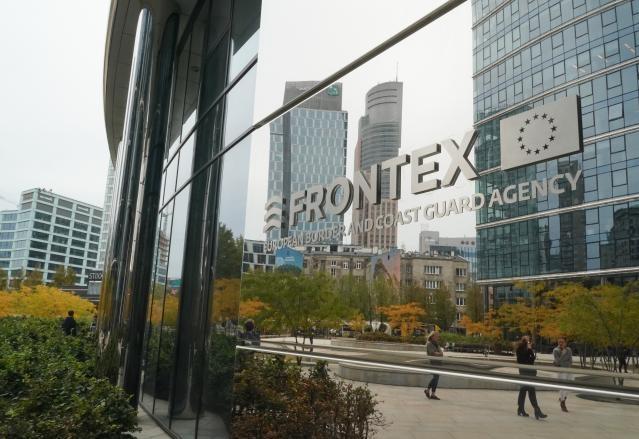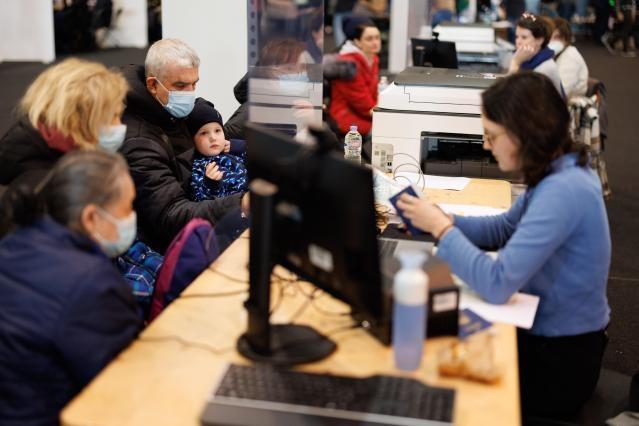Managing migration and asylum continues to be among the top concerns of Europeans. This Commission has acted on those concerns with the Pact on Migration and Asylum, which has now entered into force. With the Pact, the EU will have a common system to manage migration in a dignified and sustainable way.
Managing migration responsibly
A key element of the Pact is that Member States facing a sudden migratory pressure will not be left on their own. Countries under pressure will be able to request support from the EU and other Member States, that will contribute through migrant relocations, transfers, financial contributions, or deployment of support staff. The Pact will provide increased efficiency in procedures: from more efficient border management with screening people arriving irregularly, to streamlined processing of asylum applications. This will be supported by effective return and border procedures: upon a negative asylum decision, those with no legal right to stay will be issued an immediate return decision.
Inherent in the Pact are several safeguards to protect the fundamental rights of migrants, thanks to standardised asylum procedures, screening procedures, vulnerability checks, and independent monitoring mechanisms. Safeguards for the most vulnerable, in particular families with children, are taken into account, as the rights and best interest of children must always prioritised. For instance, they may be subject to the border procedure, only if the necessary conditions for such vulnerable categories can be applied. To support Member States in the implementation of the Pact, the Commission presented on 12 June 2024 a Common Implementation Plan, mapping out milestones to successfully start applying the new legislation by mid-2026. It will be used as a basis for the preparation of Member States' National Implementation Plans which are due by December 2024.
The Commission has also taken operational measures to support Member States immediately. Four action plans focused on specific migratory routes, and a 10-point plan for Lampedusa have put in place concrete measures including financial support to Member States, border management, and combatting migrant smuggling.
We have also concluded global partnerships with Tunisia, Egypt, and Mauritania, covering issues such as economic cooperation, cultural exchanges, better migration management, and security.
The Pact on Migration and Asylum: a fresh start
After a long political stalemate, in September 2020, this Commission showed the way for a fresh start putting forward the Pact on Migration and Asylum. The Pact provides strong provisions to deliver a long-term, sustainable solution to build a common EU system for managing migration. It provides a truly unified European system with clear rules for everybody that ensure that no Member State is left alone in managing migration, and that all countries apply fair, efficient procedures, and manage EU external borders in full respect of fundamental rights.
In December 2023, after intense negotiations, the European Parliament and the Council reached a historical breakthrough with a political agreement on key files of the Pact, allowing its final adoption and its entry into force in June 2024.
All Member States have now to put in place the legal and operational capabilities required to successfully start applying the new legislation by 2026. EU support will include technical, operational and financial assistance provided by the Commission and EU agencies.
The new rules will ensure a robust and fair migration and asylum management, including more efficient and faster procedures at the external borders. As migration is a changing phenomenon, the rules provide for flexibility in situations of crisis or force majeure in which national systems might become overstrained.
A key element of the Pact is the fair sharing of responsibility and solidarity. Member States that are particularly exposed should be able to rely on the solidarity of other Member States in case of need. The Pact creates a system that supports those countries and that still provides enough flexibility for other Member States to choose how they contribute: for example through relocations, financial contributions, or deployment of support staff to process asylum applications.
Moreover, new rules clarify the criteria for granting international protection, the rights and obligations of the refugees, and introduce stricter rules sanctioning unauthorised movements within the EU. This goes hand in hand with rules on reception conditions whereby Member States must have contingency plans to ensure sufficient reception capacity.
Unaccompanied minors will receive immediate assistance, and Member States will ensure asylum seekers with well-founded claims have the right to work. Furthermore, the new resettlement framework will provide a clear procedure on resettlement and humanitarian admission across the EU.
There is also a strong need to provide safe pathways to legal migration to the EU. To remain competitive, the EU must attract the skills and talent that our economies and our societies need. This Commission has therefore proposed a new approach to attracting and retaining talent, while supporting legal migration.
The Blue Card Directive entered into force in November 2021, and it allows highly qualified workers from non-EU countries to benefit from fast-track admission procedures to come contribute to the EU’s economic competitiveness.
Discussions with co-legislators are progressing to reach an agreement on new rules for long-term residence that will make it easier to acquire EU long-term resident status, by allowing non-EU nationals to add residence periods in different Member States in order to fulfil the requirement concerning the duration of residence. And the Single Permit Directive, adopted in April 2024, sets a single application procedure for a combined EU work and residence permit. The revised rules provide common rights for workers from non-EU countries, regarding working conditions, social security, recognition of qualifications, and tax benefits.
Innovative Talent Partnerships are being prepared with key partner countries, including Morocco, Tunisia, Egypt, Bangladesh, and Pakistan, and will combine direct support via mobility schemes, capacity building in areas such as labour market or skills, and investment in human capital. They will allow people from the countries concerned to come work, study, and train in the EU, developing new skills that can benefit later their countries of origin.
Developing legal migration must also go hand in hand with strengthened cooperation on readmission. As part of a functioning asylum and migration system, those who have no legal right to stay in Europe must be returned. The EU Return Coordinator is working closely on this with Member States in the High-Level Network for Returns.
In November 2023, the Commission also proposed an EU Talent Pool that will connect employers in the EU with international jobseekers, as well as measures to facilitate the recognition of qualifications of third country nationals.
Additionally, we have worked to strengthen relevant agencies that provide technical and operational support to Member States. The European Asylum Support Office was transformed into a full-fledged asylum agency in January 2022: the EU Agency for Asylum (EUAA), with more tools to support Member States in asylum and reception management.
Likewise, thanks to a stronger mandate, Frontex helps Member States to protect our common external borders, and to uphold fundamental rights in doing so. In February 2023, we presented the first evaluation of the European Border and Coast Guard Regulation together with an Action Plan to support its implementation. The evaluation found that, despite significant challenges including the COVID-19 pandemic, the instrumentalisation of migration, and Russia's war of aggression against Ukraine, Frontex has significantly contributed to strengthening the management of the EU's external borders in full compliance with fundamental rights.
The setting up and deployment of the Frontex Standing Corps is taking place gradually and will reach 10,000 members by 2027. Frontex staff has also been deployed at the EU external borders, and in the context of four Status Agreements with Moldova, North Macedonia, Montenegro, and Albania, Frontex has been able to deploy staff in these countries.

Strong operational measures to support Member States
The Commission has been working on a two-track approach: while the full set of migration and asylum reforms in the Pact provides a long-term solution, concrete operational measures have also been deployed on the ground to address immediate and ongoing challenges. This complementary approach is essential to support Member States operationally and cooperating with international partners.
That operational support was reflected in the Four Action Plans put forward by the Commission along the main migratory routes: the Central Mediterranean, Western Balkans, Western Mediterranean and the Atlantic, Eastern Mediterranean. Furthermore, when Italy faced a sharp increase in irregular arrivals in summer 2023, President von der Leyen launched the 10-point-plan for Lampedusa, with operational support from the EU Agencies (Frontex and EUAA) and financial support.
The actions undertaken focused on border management, preventing irregular migration, combating migrant smuggling and human trafficking, returning those with no right to stay, as well as providing legal migration pathways.
The Action Plans have yielded results. In the Western Balkans, arrivals in 2023 decreased by 31% compared to 2022 and significant efforts have been made by Serbia, Montenegro, North Macedonia, and Albania to reinstate visa regimes towards certain third countries to prevent secondary movements into the EU.
To further address visa issues, in October 2023 the Commission proposed a revision of the current visa suspension mechanism. It will allow us to respond to challenges related to visa-free travel, such as irregular arrivals due to lack of alignment with the EU's visa policy, investors citizenship schemes in visa-free countries, or hybrid threats, such as State-sponsored instrumentalisation of migrants.
Moreover, we also provided financial support to Member States. During this mandate:
Providing a haven for people fleeing the war
On 4 March 2022, only days after the start of the Russian invasion, the Commission proposed, and the Member States accepted, to activate, for the first time ever, the Temporary Protection Directive. This protected all those fleeing the war, granting them basic rights within the EU, including residence permits, access to the labour market, medical care and education for children.
More than four million individuals have benefitted from this temporary protection, and the EU has become a haven for almost one fifth of Ukraine’s children.

Preventing and fighting migrant smuggling
More than 90% of irregular migrants arrive in the EU with the assistance of smugglers, an activity that has become a multi-million-euro business in which vulnerable people put the life in the hands of unscrupulous criminals. But it is countries which should decide who comes to the EU and who can stay, not the smugglers and traffickers.
In November 2023, the Commission launched a Call to Action for a Global Alliance to Counter Migrant Smuggling at an International Conference in Brussels joined by countries around the globe. Coinciding with the launch, we also proposed new legislation to prevent and fight migrant smuggling, updating the 20-year-old legislative framework, to introduce minimum rules to counter the facilitation of unauthorised entry, transit and stay in the EU, as well as to strengthen the role of Europol.
In parallel, the Commission continues to work with partners in the Western Balkans, North Africa, and at UN level. Following the conclusion of the Memorandum of Understanding with Tunisia, irregular departures from there have stabilised, and critical equipment was delivered to partners in North Africa to intensify the fight against smugglers, border management, and search and rescue operations.
Furthermore, when Belarus tried to instrumentalise migrants in a hybrid attack against the EU in 2021, the Commission reacted swiftly, supporting the Member States concerned and working with countries of origin and transit of the migrants, agencies, and airline operators, in order to prevent innocent people from falling into Lukashenko’s trap.




